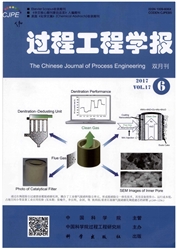

 中文摘要:
中文摘要:
研究了Klebsiella pneumoniae在厌氧摇瓶中的生长代谢特性和基质消耗情况,发现主要副产物乙醇是抑制菌体持续生长及1,3-丙二醇合成的主要因素,外源添加实验表明,8g/L乙醇可使托pneumoniae比生长速率、1,3-丙二醇比合成速率、最大菌体浓度及1,3-丙二醇终浓度分别下降21.6%,22.1%,59.6%及33.5%;指数生长期加入乙醇对菌体生长代谢的抑制作用更加明显.其他代谢副产物乙酸、乳酸、2,3-丁二醇对K.pneumoniae生长代谢也有不同程度影响,乙酸浓度仅2g/L即可对菌体生长产生抑制,乙酸浓度达到5g/L以上时对菌体生长有显著的抑制作用,而2,3-丁二醇与乳酸浓度需达到10g/L时才会对菌体生长产生显著影响。
 英文摘要:
英文摘要:
Biosynthesis of 1,3-propanediol attracted much attention recently. The cell growth and biosynthesis of 1,3-propanediol by Klebsiella pneumoniae tended to be ceased in the latter phase of anaerobic culture. The effect of environmental factors was studied in this work. It was indicated that the main by-product ethanol was the key inhibitor. Addition of 4 g/L ethanol in the culture medium would restrain the cell growth and 1,3-propanediol formation. By addition of 8 g/L ethanol, the maximum specific rates of cell growth and 1,3-propanediol biosynthesis, the maximum concentrations of biomass and 1,3-propanediol were decreased by 21.6%, 22.1%, 59.6% and 33.5% respectively. The inhibition potentials of other by-products on the anaerobic growth of K. pneumoniae were also detected. It was shown that the cell growth was inhibited obviously with 2 g/L acetic acid, yet it would not be affected even with 5 g/L 2,3-butanediol or 10 g/L lactic acid.
 同期刊论文项目
同期刊论文项目
 同项目期刊论文
同项目期刊论文
 期刊信息
期刊信息
